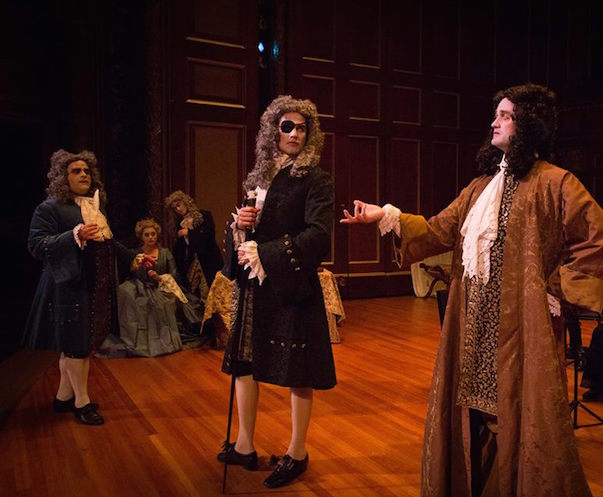Classical Music Review: BEMF’s “Acis and Galatea”—Glorious Entertainment
The music was so extraordinarily pleasant and well performed that the two-hour production breezed by. Another bouquet of bravos to BEMF, which provides us with so much pleasure year after year, concert after concert.

(L eft to right) Jason McStoots (Damon), Teresa Wakim (Galatea), Mark Williams (Coridon), Douglas Williams (Polyphemus), and Aaron Sheehan (Acis) in the BEMF production of “Acis and Galatea.” Photo: Kathy Wittman.
By Susan Miron
Handel’s music seemed to be everywhere, at least downtown, last weekend. His Messiah, a perennial favorite Christmas piece, opened, along with holiday mark-downs, on Black Friday. For those whose perfect idea of Thanksgiving weekend is to see a Boston Early Music Festival chamber opera, there was the excellent reprise of its very popular 2009 production of Acis and Galatea (at New England Conservatory’s Jordan Hall). I had just missed their earlier production before I began going every year, and was happy to experience this glorious production, and to have a chance to purchase its brand-new studio recording (from the German label cpo) of this opera with much of the same cast. (BEMF won a 2014 Grammy for Charpentier’s La Descent d’Orphee aux Enfers and La Couronne de Fleurs.)
Acis and Galatea, the tragic love story between a water nymph and a shepherd, has a long, complicated story of its own. Originally designed to be performed in outdoor gardens, Acis and Galatea was Handel’s first dramatic work set in English. Described variously as a serenata, an opera, a masque, an oratorio, or a pastoral, the piece is one of Handel’s most beloved works. Its plot comes from Ovid’s Metamorphoses, rendered into English by John Dryden in 1717. Handel’s original opera, based on the version by Dryden, was set to words by poet John Gay. Later versions of Acis included words by the poet John Huges and Alexander Pope. After Handel’s death, Mozart and Mendelssohn rearranged the score of this popular courtly entertainment. Acis and Galatea was BEMF’s second chamber opera performed on Thanksgiving weekend. Its success clearly encouraged BEMF to make an annual event of these lovely chamber operas, which for many listeners are one of the musical highlights of each year.
What makes BEMF operas so beguiling and successful is their small cadre of stellar singers, a small band (10 for this opera) of best-in-the-business musicians, and, of course, BEMF’s renowned music directors, Stephen Stubbs and Paul O’Dette. The orchestra, which sat onstage last night, was a who’s who of Early Music: concertmaster Robert Mealy, whose solos were elegant and poignant; Cynthia Roberts, violin; Phoebe Carrai, violoncello, Doug Balliett, double bass; Gonzalo X. Ruiz and Kathryn Montoya, oboe and recorder (each had solos they dispatched fabulously well); Dominic Teresi, bassoon; Michael Sponseller, harpsichord; Paul O’Dette, archlute; and Stephen Stubbs, Baroque guitar and English theorbo. BEMF’s inspired stage director, Gilbert Blin, casts his own imaginative magic on each production, as does the gifted costume designer, Anna Watkins. And the program booklet was, as always, both scholarly and readable.
When BEMF decided to take on the 1718 version of this opera, there was one big problem (besides the fact it was not intended originally to be performed as an opera). How does a stage director deal with the death in Act II of Acis, which is followed by him singing in the chorus (of five) lamenting his own death? Blin’s solution was a clever one: turning the opera into a backstage “rehearsal” in the picture room at Cannons itself, the location of its first performance. Lord and Lady Chandos (Aaron Sheehan and Teresa Wakim) who play Acis and Galatea, welcome Handel (the brilliant comic actor and wonderful tenor Jason McStoots), the poets Alexander Pope and John Gay and the Italian teacher Margherita de Epine (played by the other three cast members), all of whom were at Cannons (at some point) in 1718. It was an interesting conceit, and worked rather well.
Everyone thus had two roles. Teresa Wakim looked radiant and regal in her bluish purple gown with fetching lace at the end of its sleeves. Her ornamentation was exquisite and she sang beautifully. Aaron Sheehan, who won a 2015 Grammy Award for the BEMF (above-mentioned recording) was riveting and in hauntingly lovely voice as Acis. BEMF operas have the performing depth of repertory companies: most of the singers have had years of experience singing and acting with each other. Handel was by far the most memorable character in the ‘backstage’ cast. Played to hilarious perfection by Jason McStoots, he composes and busies himself writing and handing out music to the orchestra players, generally being a fidgeting busybody. McStoots was glorious in his one melismatic aria, “Consider fond shepherd.” The superb bass-baritone Douglas Williams Damon was a malicious-looking cyclops Polyphemus, who kills Acis in a fit of jealousy over Galatea. He wore an eyepatch strikingly, and was in particularly splendid voice. The other singers were very good, and the music was so extraordinarily pleasant and well performed that the two-hour production breezed by. Another bouquet of bravos to BEMF, which provides us with so much pleasure year after year, concert after concert.
BEMF’s next concert is the Tallis Scholars in St. Paul’s Church in Cambridge on December 12.
Susan Miron, a harpist, has been a book reviewer for over 20 years for a large variety of literary publications and newspapers. Her fields of expertise were East and Central European, Irish, and Israeli literature. Susan covers classical music for The Arts Fuse and The Boston Musical Intelligencer. She is part of the Celtic harp and storytelling duo A Bard’s Feast with renowned storyteller Norah Dooley and, until recently, played the Celtic harp at the Cancer Center at Newton Wellesley Hospital.
Tagged: Acis and Galatea, Boston Early Music Festival, Paul O'Dette
